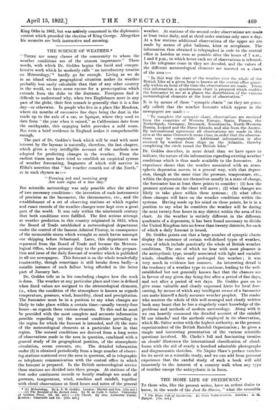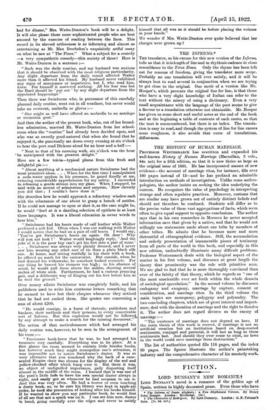11:16 HOME LIFE OF SWINBURNE.*
To those who, like the present writer, have an ardent desire to know, in the words of the Just So Stories, " what the crocodile • The Borne Life of Strinburne. By Clara Watts-Dunton. London : A. 31. Philvot. [15s. net.] had for dinner," Mrs. Watta-Dunton's book will be a delight. It will also please those more sophisticated people who are best amused by the exercise of reading between the lines. This record in its shrewd artlessness is as informing and almost as entertaining as Mr. Max Beerbohm's exquisitely artful essay on what he saw at "'The Pines." What a subject for a comedy —a very sympathetic comedy—this society of three ! Here is Mr. Watts-Dunton in a sentence :—
" Such was the daily Tontine, and my husband was anxious that it should be observed with the most religious particularity. Any slight departure from the daily round affected Walter more than it affected his friend. My husband never exhibited any signs of annoyance or impatience, but I, who read him, knew. For himself it mattered nothing. All his fear was lest the Bard should be ' put out ' by any slight departure from the appointed happenings."
Then there was Swinburne who, in pursuance of this carefully planned daily routine, went out in all weathers, but never would take an overcoat, umbrella or gloves :— " One might as well have offered an umbrella to an antelope or mountain goat."
And then the author of the present book, who, out of her bound- less admiration, married Mr. Watts-Dunton from her school- room when the "routine" had already been decided upon, and who was so sweetly good-natured that when she found that he enjoyed it, she punctually sat down every evening at six o'clock to hear the poet read Dickens aloud for an hour and a-half :- " Next to that of his morning walk, six o'clock was the hour he anticipated with the greatest delight."
Here are a few trivia—typical plums from this fresh and delightful pie :- " About anything of a mechanical nature Swinburne had the moat primitive ideas. . . . When for the first time I manipulated a soda-water syphon in his presence, he gazed fixedly at me, evincing considerable apprehension for my safety. I succeeded in releasing a gentle stream into my glass. When I stopped, he said with an accent of admiration and surprise, ' How cleverly you did that ; I couldn't have done it."
She describes how he would approach a refractory window-sash with the reluctance of one about to grasp a bunch of nettles. If he could not manage to open or shut it, as the case might be, he would "hurl at it a dazzling selection of epithets in at least three languages. It was a liberal education in swear words to hear him."
" Swinburne had his boots made of calf leather while Walter preferred a soft kid. Often when I was out walking with Walter I would notice that he had on a pair of calf boots. I would say, ' You've get Swinburne's boots on again. Oh dear Why will you not look ? ' Walter would laughingly reply, ' And the joke of it is the poor boy can't get his feet into a pair of mine.' . . . Swinbume was always very plainly dressed, and I never saw him wearing any other sort of tie than a plain black silk one. At home, and sitting restfully in his chair with a book, he offered no mark for the caricaturist. But outside, when he had donned his wideawake, he somehow looked eccentric. For one thing he braced his trousers too high ; in his absence of mind, he would pull them above the ankles, showing several inches of white sock. Furthermore, he had a curious prancing gait, and a deliberate way of flinging out his feet before him as he trod the ground."
Over money affairs Swinburne was completely futile, and his publishers used to write him courteous letters remarking that he seemed to have lost their cheques whenever they noticed that he had not cashed them. She quotes one concerning a
sum of about £200.
" He would consign, in a burst of rhetoric, publishers and bankers, their methods and their persons, to every conceivable sort of Inferno. But this explosion would not be followed. by any attempt to make a search for the missing document."
The action of that meticulousness which had arranged his daily routine was, however, to be seen in the arrangement of his room :- " Passionate book-lover that he was, he had arranged his treasures very carefully. Everything was in its place. At a ,first glance the room seemed to contain little besides books, but however much they might monopolize one's attention, it was impossible not to notice Swinburne's duster. It was so very obtrusive that you wondered why the back of a cane- seated Empire chair was chosen for the display of the red and yellow-checked affair which hung over it. But there it was, an object of undignified importance, gaily disporting itself almost in the middle of the room. I learned that it was one of the poet's little fads -to have his own special duster always in sight, and easily sot at whenever he had oecaeien to use it. And, this was very often. He had a horror of even touching a dusty book, so, to be sure his library was kept in apple-pie order, be took the precaution of looking after his books himself. If he wanted to show you any particular book, he would first of all see that not a speck was on it. I can see him now, duster in hand, going carefully over the edges and cover to satisfy
himself that all was as it should be before placing the volume in your hands."
We wonder if Mrs. Watts-Dunton over quite believed that her charges were grown up ?



































 Previous page
Previous page